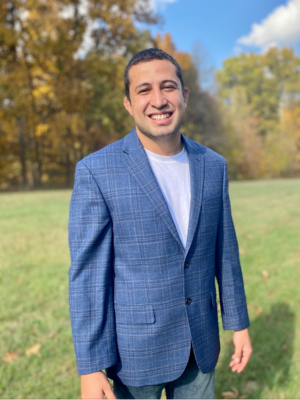Meet Carlos Munoz
 Tell us a bit about your background:
Tell us a bit about your background:
I am a first-generation Mexican-American student from Los Angeles County. I grew up in a family of 5 the youngest of three. My parents (Rachel and Jose Munoz) are from Mexico City, Mexico, and moved to Los Angeles in the early 80s to give their family new opportunities. As I grew up in a predominately Hispanic community I was exposed to STEM programs from neighboring colleges and through this I began to grow my interest in Engineering. Upon graduating from high school, I made the choice to pursue a Chemical Engineering degree at the University of California San Diego (UCSD). My focus at UCSD was centered around comprehending and innovating more efficient processes to enhance production yields. This phase of my education instilled the foundational principles of engineering in me. However, a series of experiences led me to the realization that Bioengineering held a greater appeal for me than the field of Chemical Engineering. In my third year as an undergraduate at UCSD, I approached Dr. Pedro Cabrales to explore the possibility of shadowing a member of his group. This initiative was aimed at gaining insights into the realm of Bioengineering and its scope. This shadowing experience ignited my curiosity and intensified my inclination towards pursuing a career in Bioengineering. Following a year-long break to work as a process engineer, I returned to UCSD with the intent of pursuing a graduate degree in Bioengineering. My journey as a graduate student has provided me with the chance to oversee multiple projects, mentor upcoming undergraduates, present my research interests in front of sizable audiences, refine the art of crafting academic papers and grant proposals, and even establish my very own startup venture. Collectively, these experiences have shaped me into an individual whom I confidently affirm I am proud to be today.
What are you studying/researching?
My current research interest involve the engineering of the hemoglobin protein for a variety of use cases. Hemoglobin is a protein known for its role to carry oxygen to and from the lungs to oxygen deprived tissues, however, hemoglobin is also known for its inherent toxic traits such as renal failure, hypertension, and vasoconstriction. In cases of extreme hemolysis (sickle cell, thalassemia, surgical heart procedures,etc.) the concentration of hemoglobin in the circulation rise and cause a negative feedback loop of issues that only worsen patient outcomes by increasing mortality. As a member of Dr. Pedro Cabrale's Functional Cardiovascular Engineering laboratory we have engineering hemoglobin to become a scavenger protein that will aid in the treatment of these issues. The protein utilizes its ability to be recognized as normal hemoglobin in the native bodies immune system , but does not cause the same harm as the native hemoglobin. Thus, it can treat patients by reducing the effects and promote a promising patient outcome.
LinkedIn: https://www.linkedin.com/in/carlosmunoz94/
Tell me a little bit about your campus involvement at UC San Diego.
As a member of the UC San Diego community I have aligned myself as a mentor for a number of programs sponsored by the IDEA Center to help under represented undergraduate student get a chance to work in a research group similar to what I had the opportunity to do when I was first at the university. Furthermore, I have built a strong working relationship with the Institute of Global Entrepreneurship (IGE) here on campus. They have provided me with great deal of resources and gave me a platform to build my own start up venture. Although, I live off campus I make sure to participate in events around campus to keep my engagement high so I can be in position to help mentor younger students.
Why UC San Diego?
I am strongly family orientated and when weighing my options as a young adult right out of high school I choose UC San Diego due to its physical location from my family. The campus is locate an hour an a half south from my family in Los Angeles and for me this was a huge selling point.
Have you been awarded any fellowships or grants during graduate school? If so, which ones?
I was the recipient of the Minority Abstract Achievement award sponsored by the American Society of Hematology (ASH) in 2022.